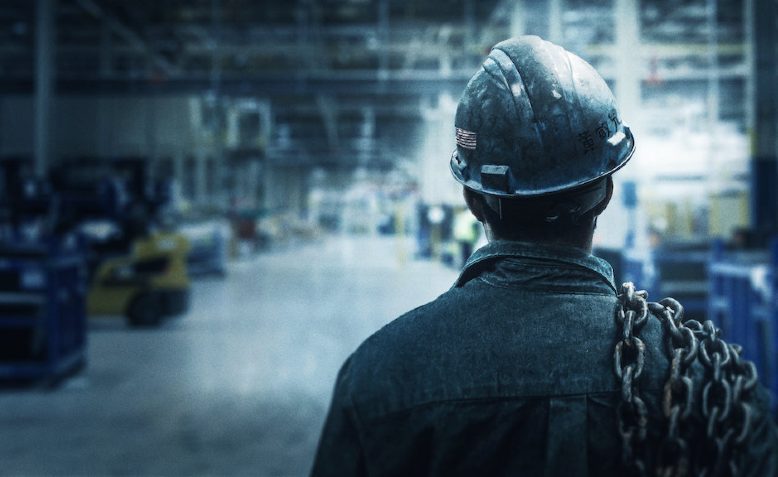 American Factory, Netflix
American Factory, Netflix
American Factory is a powerful documentary about neoliberalism and globalisation and its impact on working class communities, writes Don Davies
During lock-down I’ve been asking people what I should catch up on the various TV and film networks. One that has been strongly recommended is American Factory on Netflix. After watching it, I’d thoroughly endorse the recommendation!
American Factory is a documentary from 2019, directed by Steven Bognar and Julia Reichert. It tells the story of Chinese company Fuyao’s takeover of an old GM factory in Dayton, Ohio.
Dayton is in ‘rust belt’ America; one of the old manufacturing towns destroyed by the recession of 2008.
When GM closed their factory in the town, 10,000 were thrown on to the dole.
At the start of the film, we hear stories from former GM workers about what unemployment meant for them. Several lost their homes. All struggled to find work. All were living in poverty.
The opening of the Fuyao plant seemed to offer some hope for a better future. Initially, workers are enthusiastic about the prospect of regular work again.
Fuyao make glass parts for the car industry. For local politicians at the official opening, they represent the return of the car industry and manufacturing to the town.
Bognar and Reichert managed to get unprecedented access to the factory, to company meetings, even to the company’s Chinese headquarters. They allow workers to speak about their lives, their hopes and their anxieties. Managers and senior directors talk of their pride in the plant, as well as the demands the company makes to ensure profitability.
The company bring 200 workers over from China and their voice is heard as well. In fact, early on we discover that the Chinese workers had no choice but to come to America. They left family behind and didn’t even get any extra pay when they were uprooted.
Bognar and Reichert use their access to good effect.
At one level the documentary tells a story about different cultures and traditions. It partly tells a story about how differences are overcome, suspicions challenged and how work brings people together. One older GM worker invites his new Chinese brothers to his house for thanks giving and says they are proud to have each other’s back.
The factory owner, ‘Chairman Cao’, has close links to the Chinese Communist Party hierarchy. His connections have helped him generate huge personal wealth. As he flies home on his private jet he tells us we ‘live to work’ and, without any irony, how money is not important – something the fabulously wealthy always say whilst guarding their wealth and profits from even the mildest redistributive policies!
But this is primarily a story about the impact of neoliberal globalisation. The company push an agenda of low wages, unregulated work, long hours and, especially, hostility to unionisation.
In 2008, GM paid $28 an hour, when the factory opens in 2016 Fuyao pay $12 an hour. The managers complain that workers want weekends off, and won’t work 12 hours a day. Workers tell of pollutants being poured down drains and into local rivers.
Of course GM didn’t pay $28 because they were ‘nice’ or better employers. They paid that because the workforce was organised into the United Automobile Workers union (the UAW).
Poor pay and work intensification push some to start a unionisation and recognition drive.
The company are furious. They pay a ‘Union avoidance consultancy’ $1million to stop recognition.
Militants are sacked. Chinese workers are told various horror stories about unionisation. All workers are forced to attend three anti-union meetings. As they fear they may lose they announce a two dollar an hour pay increase.
When the vote is taken just over 40 per cent of the workforce vote for union recognition, but the vote is lost.
This is a powerful, moving documentary about the impact of globalisation on working class communities. It emphasises the dangers of the ‘race to the bottom’ in terms of wages and employment regulations.
But it also emphasises that, in the face of such attacks, workers respond and fight for better conditions: it emphasises that class conflict is built into the system
And this leads to my one criticism.
The documentary tends to portray Chinese workers as acquiescent to the demands of ruthless employers. But even a brief look at labour relations in China emphasises this is not accurate. Like their American counterparts, Chinese workers continue to fight for better wages and conditions.
The clash of cultures that the film emphasises is that between bosses and workers the world over.
Do yourself a favour – watch this documentary!
Join Revolution! May Day weekender in London
The world is changing fast. From tariffs and trade wars to the continuing genocide in Gaza to Starmer’s austerity 2.0.
Revolution! on Saturday 3 – Sunday 4 May brings together leading activists and authors to discuss the key questions of the moment and chart a strategy for the left.

